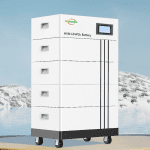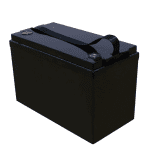In the digital age, telecommunications applications connect people and businesses worldwide. From mobile phones to Internet services, the need for reliable, uninterrupted communication continues to grow. Behind the scenes, the 100Ah lithium ion battery module is essential to telecommunications infrastructure, ensuring continuous power supply for critical equipment. This article will discuss the vital role of 100Ah lithium-ion battery modules in telecommunications.
As a reliable backup power solution
The 100Ah lithium ion battery module provides high energy density, allowing it to store large amounts of energy in a compact, lightweight form. This compact size allows easy integration into telecommunications equipment racks or cabinets. Secondly, lithium-ion battery modules provide fast charging and discharging capabilities, providing fast response times during power outages to ensure the continuous operation of telecommunications equipment. Rapid charging allows batteries to quickly replenish energy reserves, while immediate discharge ensures critical equipment remains powered until average power is restored or backup generators are activated. In addition, the long cycle life and high reliability of the 100Ah lithium-ion battery module are also very suitable for backup power applications in telecommunications.

100Ah lithium ion battery module optimizes energy efficiency in telecommunications
The 100Ah lithium ion battery module optimizes telecom energy efficiency by providing reliable backup power and facilitating energy storage and management solutions. They act as energy storage devices, capturing excess energy during off-peak hours or when renewable energy sources such as solar or wind are plentiful. Users can utilize this stored energy during peak demand or blackouts, reducing reliance on grid power and minimizing energy costs. The 100Ah lithium ion battery modules also aid load balancing by efficiently distributing power across telecommunications infrastructure to match supply with demand. They can store excess energy when demand is low and release it when demand increases, ensuring a stable and reliable electricity supply without overloading the grid or wasting energy.

Supporting remote and off-grid locations in telecommunications
The 100Ah lithium ion battery module provides reliable power to remote and off-grid telecommunications sites, ensuring uninterrupted operation of critical equipment such as base stations, repeaters, and communication towers. These battery modules have high energy density and long cycle life, allowing them to sustain telecom operations without frequent maintenance or replacement. They also offer fast and easy deployment in remote and off-grid locations, providing instant backup power and connectivity without requiring extensive infrastructure development or grid connections. This rapid deployment capability enables telecom operators to quickly respond to changing market demands and emergencies, ensuring continuous customer service.

100Ah lithium ion battery module ensures scalability and flexibility
The 100Ah lithium ion battery module is highly scalable, enabling telecom operators to expand their backup power capacity as network demand proliferates. Additional battery modules can be added to existing systems to accommodate increased power demands during emergencies or extended operating hours, ensuring scalability to meet future needs without significant infrastructure changes. They adopt a modular design and are easy to install, maintain, and replace, enhancing the flexibility of telecom network deployment. The modular battery system can be customized to meet specific space constraints or power requirements, making it suitable for various telecommunications applications, including base stations, data centers, and remote sites.
Enhance telecom network resilience
100Ah lithium-ion battery modules can also enhance the resiliency of telecommunications networks by providing reliable backup power. They can increase the redundancy of telecommunications networks by providing backup power redundancy for critical equipment and infrastructure. By deploying multiple battery modules at network nodes and communication sites, telecom operators can create redundant power systems, enhance network reliability and resiliency, and reduce the risk of service interruptions due to power or equipment failure. In addition, they can support remote monitoring and management capabilities, allowing telecom operators to monitor battery performance and health in real-time from a central location.
Powering telecom applications
100Ah lithium-ion battery modules are the most integral component of modern telecommunications infrastructure, ensuring reliable power supply, optimizing energy efficiency, supporting remote and off-grid locations, and enabling scalability and flexibility. By leveraging the capabilities of 100Ah Li-ion battery modules, telecom operators can meet growing connectivity demands and adapt to changing industry trends.










